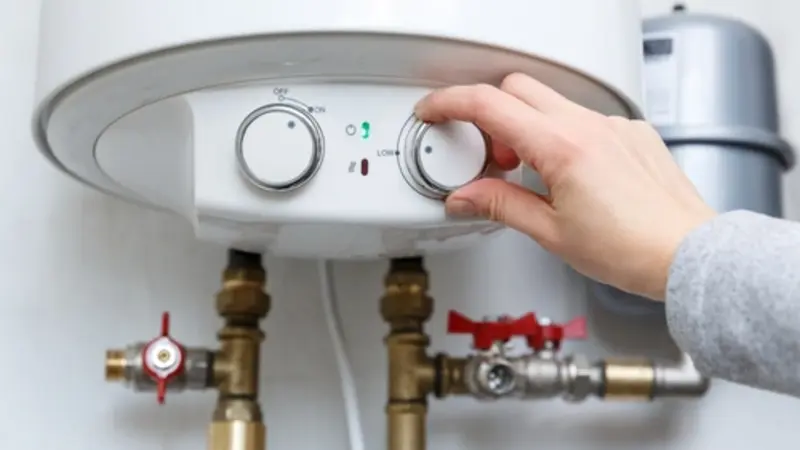Staying alert to your water heater’s performance protects your household’s comfort and saves money by avoiding sudden breakdowns or major water damage. Whether handling an unexpected issue or considering a water heater setup Orem for a more dependable hot water supply, recognizing early warning signs is essential. Knowing when your water heater needs attention ensures you never face a cold shower, unexpected water leaks, or high repair bills.
Below, you’ll find a comprehensive guide on the most common warning signs of water heater trouble and actionable steps to maintain your system’s health and efficiency.
Key Takeaways
- Inconsistent water temperature or a lack of hot water often signals issues with the heating element or thermostat.
- Unusual noises, such as popping or rumbling, may indicate sediment buildup in the tank.
- Rusty or discolored water suggests internal corrosion, which can lead to leaks.
- Visible leaks or pooling water around the heater are signs of potential failure.
- An aging water heater (typically over 10 years old) is more prone to inefficiencies and breakdowns.
Inconsistent Water Temperature
Variations in water temperature or a complete lack of hot water are common complaints among homeowners. These problems usually point to a faulty thermostat, heating element, or excessive sediment buildup in your heater’s tank. When internal components aren’t functioning as they should, hot water delivery becomes unreliable. Timely inspection from a qualified technician can quickly restore your system’s consistency, reducing inconvenience to your daily routine.
If you’re troubleshooting independently, check for tripped breakers and verify your heater’s settings to ensure there hasn’t been a simple adjustment error. For persistent problems, professional assessment will pinpoint whether repairs or replacement parts are needed.
Unusual Noises
Strange sounds from your water heater, including banging, rumbling, or popping, often result from sediment that collects at the bottom of the tank. As water heats, sediment hardens, forming a barrier between the burner and water, forcing your heater to work harder. This reduces efficiency, shortens the system’s lifespan, and spikes utility bills.
Routine flushing helps minimize buildup and keeps your water heater running quietly and efficiently. According to the U.S. Environmental Protection Agency, sediment buildup is a leading cause of inefficient operation, making annual tank maintenance crucial for optimal performance.
Discolored or Rusty Water
Brown, yellow, or rust-tinted water from your taps can be alarming. This discoloration usually stems from internal tank corrosion, which, if left untreated, can lead to pinhole leaks or major tank failures. It’s important to distinguish whether the discolored water only appears when the hot tap is running—if so, your water heater is the likely cause.
The anode rod inside every tank-type water heater is designed to attract corrosive elements and protect the tank’s steel lining. Once the rod is depleted, internal rusting accelerates. Replacing the anode rod every few years can help prevent internal corrosion and maintain water quality.
Leaks and Pooling Water
If you notice water around your water heater, don’t ignore it. Pooling water can originate from loose fittings, worn-out gaskets, or a cracked tank. Even minor leaks can escalate quickly, causing water damage to floors, walls, and foundations and fostering conditions for mold.
Immediate intervention is needed—turn off your heater’s power and water supply and consult a licensed plumber. Addressing leaks promptly can make the difference between a simple fix and a costly replacement. The Insurance Information Institute provides tips on avoiding water damage.

Age of the Water Heater
Water heaters generally last 8 to 12 years, though diligent maintenance can extend their lifespan. As systems age, their efficiency declines, and the risk of frequent breakdowns rises. Consider a proactive replacement if your unit is approaching a decade or more of service, even without obvious symptoms. Modern, energy-efficient units can reduce operating costs and environmental impact, improving comfort and sustainability in your home.
Also read: Erin Perrine husband
Preventive Maintenance Tips
Routine maintenance is the best defense against premature heater failure. Preventive care extends your water heater’s life and ensures it operates at peak performance, keeping your water and energy bills under control.
- Flush the tank once a year to remove sediment, especially if you live in an area with hard water.
- Inspect the anode rod every two to three years and replace it when it is extensively corroded.
- Examine piping and connections for leaks or rust—addressing issues early can prevent major repairs.
- Set the thermostat to 120°F to balance energy savings and safety, preventing scalding or overheating.
- Schedule an annual professional inspection for comprehensive safety and performance checks.
Conclusion
Proactive care and early detection are key to running your water heater smoothly. By recognizing early warning signs—like temperature fluctuations, strange noises, rust, leaks, or the effects of age—you can make informed decisions, avoid costly emergencies, and enjoy uninterrupted access to hot water. Don’t overlook routine maintenance, as it’s your best tool for maximizing efficiency and peace of mind.
